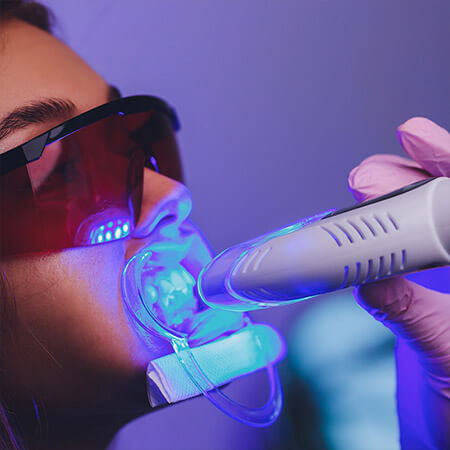
Teeth Whitening in Turkey
How Much Does Teeth Whitening Cost?
Professional Teeth Whitening
Examination And Consultation

Teeth Whitening Process

Common Bleaching Agents

Trusted by Celebrities & Influencers Worldwide
Chosen by Celebrities and Leading Influencers
Advantages of Teeth Whitening
There are many benefits to a professional teeth whitening procedure. Such as:

Boosting Smiles and Confidence
Professional teeth whitening improves the aesthetics of your smile. It also gives you a confidence boost in personal and professional interactions.

Oral Hygiene
Teeth whitening procedures improve oral health by removing all types of stains and discolorations from the teeth. As the maintenance of teeth whitening requires regular cleaning by dental professionals, it reduces the chances of cavities, dental caries, gum disease, and plaque formation.

Quick Procedure And Results
Professional teeth whitening provides almost instantaneous results and with proper maintenance, the whitening effect may last anywhere from 6 months to 3 years.

Safer And Consistent Outcomes
The whitening process is done at a reliable dental clinic. Professional dentists are in charge of supervising it, ensuring a safer procedure. This leads to more consistent and long-lasting outcomes.

Boosting Smiles and Confidence
Professional teeth whitening improves the aesthetics of your smile. It also gives you a confidence boost in personal and professional interactions.

Oral Hygiene
Teeth whitening procedures improve oral health by removing all types of stains and discolorations from the teeth. As the maintenance of teeth whitening requires regular cleaning by dental professionals, it reduces the chances of cavities, dental caries, gum disease, and plaque formation.

Quick Procedure And Results
Professional teeth whitening provides almost instantaneous results and with proper maintenance, the whitening effect may last anywhere from 6 months to 3 years.

Safer And Consistent Outcomes
The whitening process is done at a reliable dental clinic. Professional dentists are in charge of supervising it, ensuring a safer procedure. This leads to more consistent and long-lasting outcomes.
Types of Teeth Whitening Procedures
For the treatment of both intrinsic and extrinsic stains, there are three types of common dental whitening treatments for both intrinsic and extrinsic stains:
This is the most effective and long-lasting form of teeth whitening. Teeth whitening at a dental clinic has two main benefits. It offers effective whitening and a higher safety profile.
Trained dental practitioners use higher concentrations of bleaching agents. They address both intrinsic and extrinsic stains. This helps restore tooth color. The results of sessions at a dentist’s office are quick and last longer than other forms of whitening treatments.
Dentists are trained professionals who minimize risks to your teeth and enamel. This raises the safety profile of the whitening treatment.
Ready to smile with confidence?
Book your visit today and experience the Cinik difference. New patients receive a complimentary virtual consultation.